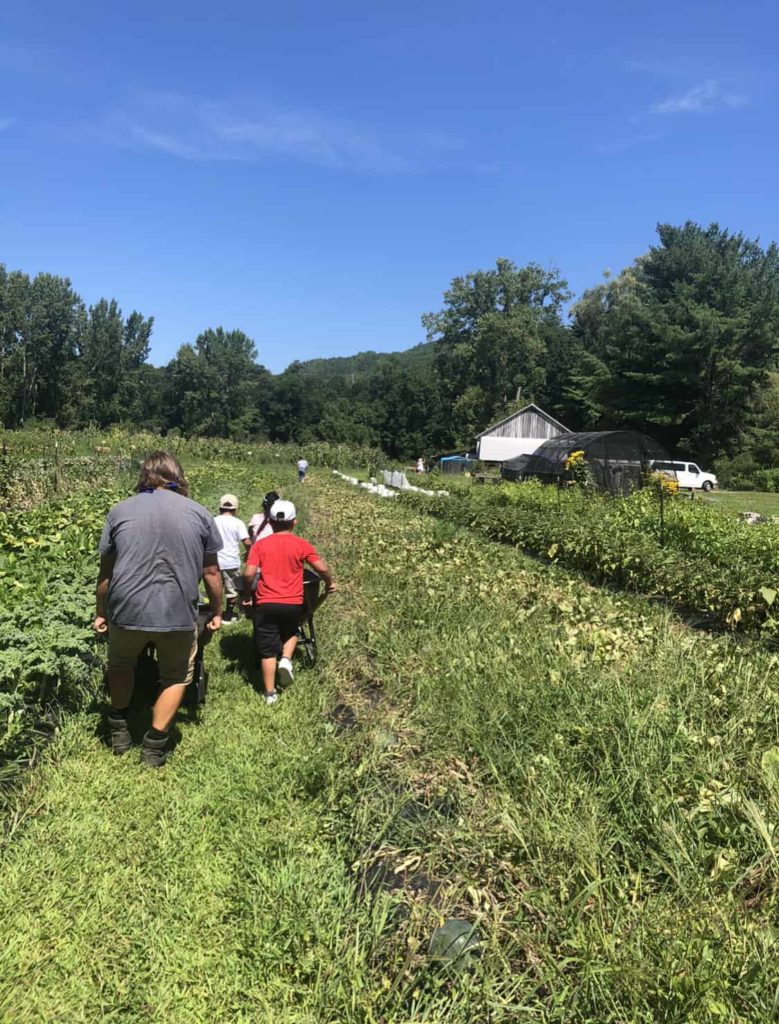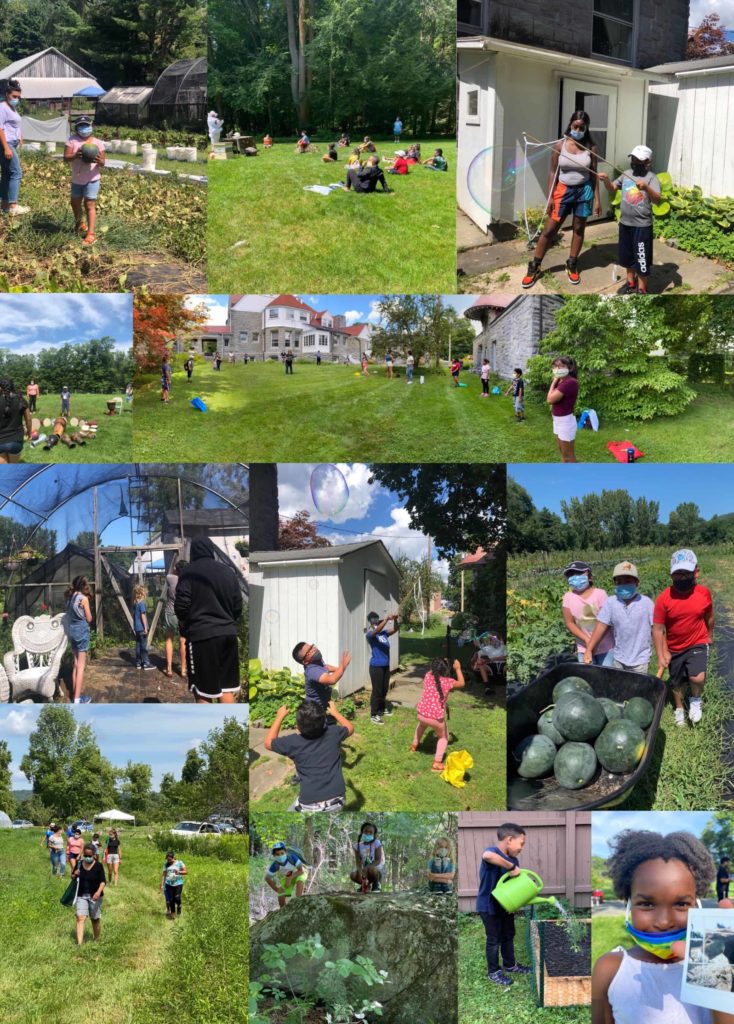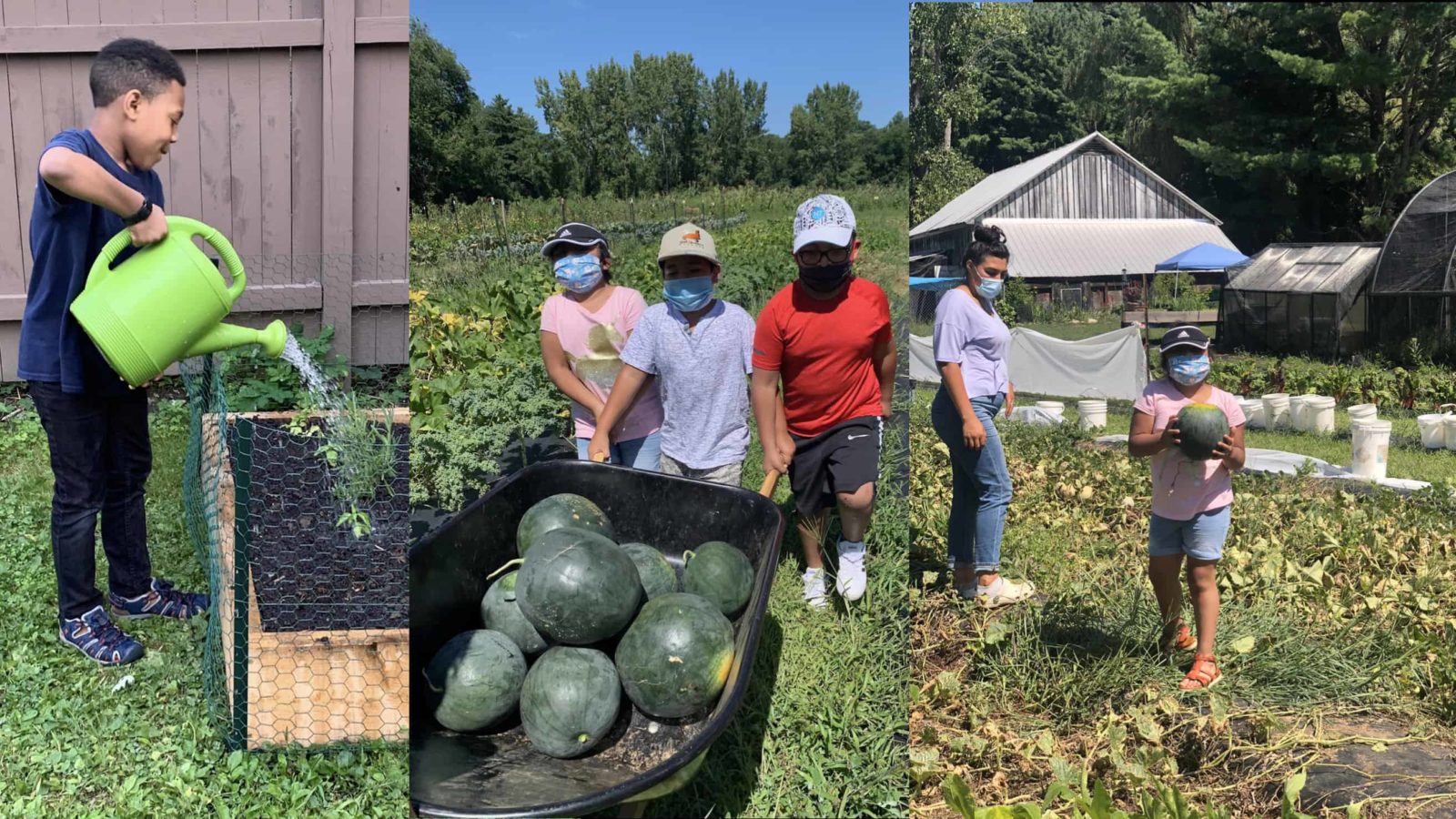On a quiet, warm evening, Don’Jea Smith can pick tomatoes. She can feel the warm slender fruit in her hands and the way it will come away from the plant with a gentle lift. It’s new to her, the sharp, green and spiced scent of tomato plants, the feel of the earth and the hum of crickets. She has felt it stir and fill her.
“The wind’s hitting differently now, because I have these plants,” she said. “I’d never gardened in my life. Now it’s something my partner and I can do.”
She speaks confidence and gladness and a sense of strength.
“I’m overwhelmed with so much joy and work ethic, my heart wants to fly,” she said. “I’m going on more walks — my own fear (of being out in the woods) is lessening. I’m so glad I’m getting a chance to build that connection with the land, that connection with my ancestors since we got here.”
She has found that closeness and her garden through Multicultural Bridge. She is the executive assistant at Bridge and a recent graduate from the Massachusetts College of Liberal Arts in creative writing. She has joined Bridge this summer, and as she works with programs ranging from education to social justice, she has become involved in a new program in food sustainability that Bridge has grown in response to the pandemic, helping families to connect with local farms and grow their own harvests.
“Covid-19 brought out the connection between the land, food … and equity,” said Bridge’s founding director, Gwendolyn VanSant.
As the quarantine came down without warning, she began to hear from local families.
“We would hear from parents, ‘we both lost our jobs,’” VanSant said. These were families living paycheck to paycheck. “They’re farm workers, people who have cleaned a restaurant on a cash basis for 24 years …”
Losing income over night left them vulnerable, she said. Many of them are not keyed into nonprofit services. Some have had uncomfortable experiences with local food distribution, or people in their family have. Some are not sure what services could disqualify them for future citizenship, as they have been working toward it for many years. Some may have lost the family and support they have relied on in the past.
“We have black elders who had lost partners,” VanSant said, “and their one communal safe space, church, was not able to run. Services were cut off.”

A Gideon's Garden group leader brings in a full wheelbarrow with Aylin Lopez with her older brother, Diego Lopez, and Jonathan Cedeno. Photo courtesy of Multicultural Bridge.
Bridge has always worked to give local families larger access to fresh food, she said, in friendly and informal ways. They have led a summer program for more than 10 years, and as they have taught languages and local history, drumming and beekeeping, storytelling and making handmade books, they have also brought their students outdoors and given them a taste of gardening and growing their own food, and self-sufficiency.
“The kids plant seeds with Grace Church and Taft Farms, VanSant said. “We promote food access through snacks and sharing the harvest.”
Bridge also has a group for Berkshire immigrants, meeting companionship and support, and they serve a meal for the women and children who come, twice a month.
And so in March, in response to the growing crisis, Bridge began a new program in Food Sovereignty and Sustainability, with the help of Berkshire donors. In the first days, 23 families got in touch, VanSant said. At first she helped them to find food for two weeks, so they could stay home. In the first few weeks, Bridge focused simply on collecting and giving supplies from local supermarkets, but VanSant and her team began early on to seek fresh food.
Bridge began to source meats from Hill and Hollow Farm, she said. She and Jen Salinetti from Woven Roots Farm in Great Barrington began dreaming about fresh vegetables. VanSant sought out farms led by queer farmers, by women, by people of color. Random Harvest has given fresh vegetables wholesale.
Since then the program has grown in size and scope. By mid-July, Bridge had 91 families involved. And VanSant wanted the program to grow beyond food distribution, to help these families find sustainable resources and stability. Some have grown up in another country and have grown and raised their own food in the past, but have not had the room and resources to do the same here.
“For them, staying at home and eating on a low budget (means) having a garden and a few chickens,” VanSant said.
Others had not had the tools or the space to plant a garden. So Bridge and Woven Roots Farm partnered to give them both.
“In the New Pathways Labs,” VanSant said, in a series of talks and podcasts Bridge has created this summer, “Jenn or Anna says if you give someone a tomato, they will have food for a meal, but if you teach them to plant a tomato they will have food for life. Give more than you take, for good.”
Bridge worked with volunteers from the Greenagers, a local nonprofit with a focus on youth, community and the environment, to build new garden beds, so that families could grow their own food at home, and Bridge has also raised funds to support local families with CSA shares in local farms.
“We have put in 25 raised beds,” VanSant said, “and gotten funds for 30 farm shares. We have gotten fresh vegetables from Random Harvest, and local, queer and PoC-led farms. We’re creating a sustainable structure. This is a pilot program with Bridge staff and the Woven Roots group.”
‘We’ve seen such enthusiasm and joy.’
The program has grown through conversations and connections. Gwendolyn and her fellows at Bridge have reached out to people they know, and asked them in turn for anyone they know who might join in.
Bridge and Woven Roots brought in seeds and seedlings for plants that matter to the families who are growing them, Van Sant said — some Latinx families have grown cilantro, tomatillos, poblano and jalapeño peppers, and some black families have grown okra and collard greens, food that feels familiar and culturally relevant to them.
Through the summer, Salinetti has worked with Bridge and all of the families with garden beds, teaching them how to care for the young plants, how to feed the soil and keep track of sun and water, and how to grow plants in this temperate climate.
“People have the knowledge,” she said, “and now they’re going gangbusters.”
They are learning about the character and culture of their garden plants and why people are growing what they are growing — if they plant marigolds now, could some still bloom as late as November 1, when families in Central and South America honor their lost loved ones on Día de Muertos, the day of the dead?
Twenty seven families have come together around these gardens, and as many as 290 people. They have shared recipes and strategies for discouraging deer and rabbits. As harvest season comes in, the gardens are looking lush.
“This is the exciting time,” VanSant said. “Tomatoes, zucchini, peppers. At first we had a lot of greens, kale, escarole. We’ve talked about all the different parts of a plant you can eat.
“… We’ve seen such enthusiasm and joy.”
People share photos of their gardens and their harvests, she said. They meet online for the courses and find their gardens gathering people together as they talk, virtually and sometimes in their home neighborhoods.
Now she is looking ahead to the fall and to next spring. As the harvest comes in, and as families enjoy their farm shares, Bridge and Woven Roots will lead classes on jarring and canning to preserve it.
Later, as the season for fresh vegetables wanes, she may have to shift to some local shops for some of the supplies in the food distribution. She plans to support locally owned businesses as much as possible, she said, like Smokey Divas barbecue and El Punto de Encuentro, the Latinx market in downtown Great Barrington. And she sees the program growing into the future.
“We have seeds now for the next year,” she said, “and an educational core on how to plant for New England.”
Tending her garden by hand has given Smith a feeling for the work involved, and she has enjoyed it. Weeding and caring for her plants may bring sore muscles and muddy boots, rain and honeybees. It has helped her to feel comfortable outdoors.
“Woven Roots usually does everything by hand,” she said, “no machines. Nature’s not safe, but we have that connection — I feel it now.”
Helping families to find that connection again matters, VanSant said. That confidence matters. Beyond teaching the names of plants or the taste of wild grapes, the gardens she has helped to build have also helped to build self-reliance and a sense of belonging.
“Jamal at Wild Seed and Leah Penniman at Soul Fire Farm talk about and work for the empowerment Don’Jea expressed,” she said, “and in this program it was like the immigrant women were waiting for (these tools) to be available. Green, fresh gardens are beautiful.”
It feels essential to her, now more than ever, for the local economy and families struggling in the pandemic, to support black and brown communities.
Her work speaks and responds to a long history among many people of color, she said, who have traditionally worked closely with the land. And here, for generations, many have lost this kind of connection: Migrant workers, enslaved people coming here from Africa, the Mohican and Kanien kehaka and many nations forced to leave the lands here where they had lived and farmed for centuries, immigrants and black families who have moved to the cities looking for work.
“In Covid,” she said, “the people affected most are living in poverty. Bridge’s mission is about who’s left behind, marginalized.”
After 10 years of work, she said, people know Bridge and trust them
“It’s been Bridge’s mission for 12 years, and since March,” she said, “to be a catalyst for change and integration. We do the work of trying to shift systems and hearts and minds. (We do that work) on farms, and with children who are 5 and bankers who are 50. … We do this work well because we think about community and humanity.”

Bridge families pick the harvest from their new gardens. Quinton Hayes waters his plants, and Aylin Lopez tends homegrown watermelons with her older brother, Diego Lopez, and Jonathan Cedeno. Photos courtesy of Multicultural Bridge.

